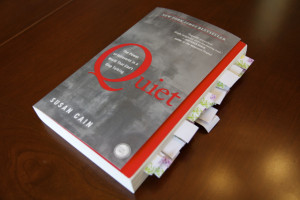August is almost over and that means the end of summer. We’ve got some thoughts on guilt, meltdowns, and how our months off might look different next year.
 Summer Guilt, 2015 Edition
Summer Guilt, 2015 Edition
There is no question that Doodlebug learns something important every summer at camp. I don’t mean things like facts about rocks or a new art technique. I mean something about Life. One year, it was that new things are always easier with a friend. Last year, it was that sometimes you have to try new things on your own, but that you’ll survive and maybe even have fun.
This year, she learned that things sometimes look good on paper but turn out to be boring in real life. Also that some kids are just mean.
So yeah, camp didn’t go so well this time around. It didn’t help that iDad and I knew Doodlebug would much rather be home, doing Minecraft or reading or playing with Shopkins. Or, you know, spending time with us. Nothing like a tearful conversation about why parents still have to work all summer to make you question your priorities.
And part of me says, look, we do still have to work. She’s old enough to get that. We did all kinds of things together this summer. Two weeks of half-day camps—thirty hours out of an eleven-week summer—is not cruel and unusual. Yes, she had some rocky moments, but she made it through and I’m proud of her.
Another part of me says, yeah, but it’s camp. You always hated it yourself. Remember Vacation Bible School? Remember the Girl Scout day camp? <shudder> I’m an introvert raising an introvert. I know that camp might turn out to be fun, or it might be a giant drain on your energy tank. That’s the opposite of what summer is for.
So this, I’ve concluded, is the paradox of summer: I feel like I can only gain time for myself by taking it away from Doodlebug. The two weeks of camp were great for iDad and me. We both got much more done without having to scramble around and cover each other’s work time. I felt like I could think straight again after being pulled in a million different directions for weeks. It was a good feeling. But it came at the price of an unhappy kid. Why hello, guilt. So nice of you to join us.
I never feel guilty about sending her to school, just like I never felt guilty about putting her down for a nap when she was two—those are things that have to happen. Learning and sleeping are her jobs, jobs that just happen to come with a side of alone time for me. But camp is different. Camp is optional, and so who is it for? Her, or me? And if it’s for me, is that okay? My head says yes, my heart says no.
So next year, we’ll see. Maybe we’ll try going camp-free, and maybe she can have some sort of long-term summer project to give us some structure. You know I love structure. I’m sure we’ll be able to figure this all out before she turns 18 . . . right?
— Kathy

Mega Monster Meltdown
Or, the Afternoon I Wished Parenting Weren’t One of My Core Personal Projects
“We’ve all been there,” she said, looking at me with sympathetic eyes. I muttered something like “Thanks” or “Do you want him?” as I walked by her, struggling to contain Lunchbox.
What started as a small disagreement had escalated to a meltdown; I calmly told him it was time to leave the pool. He lost it and suddenly we were at DEFCON 2 in terms of his behavior. I slung him over my shoulder like a sack of potatoes while he kicked and screamed “Nooooooooooooo!!” at the top of his lungs. I was mortified. All eyes were on us as we trudged toward the exit.
After fighting to buckle him into his carseat, I turned on the car and took a deep breath. My hands were shaking and I felt like barfing. This was my worst fear — that my first summer with the kids would be filled with these types of episodes. Could I handle them? What would I do if I lost my temper completely and did something I’d regret? I knew the tantrum would eventually fizzle out and that a cocktail (or four) would help calm me down, but what, if anything, could or should I do to prevent this type of situation? Both Slim and Lunchbox had had their moments, but this was one, if not THE, worst one yet.
Developing a strategy for my first Teacher Mom Summer (TMS) had taken some time. Dreamy and I decided not to enroll the kids in any camps, hoping to save money, and I wanted them to sleep late, eat breakfast in their pjs, and, in general, be lazy. I asked Slim and Lunchbox about things they’d like to do and we came up with a list. We’d do one Big Thing each week (a movie, a museum trip, Lunch with Daddy) and divide up the the rest of the days with visits to the pool, the park, and play dates. Chore and Screen Time would be worked in as well.
This worked for a few weeks. The routine was nice but interrupted by some bigger projects I had hoped to accomplish during the break (such as cleaning, redecorating, and organizing Slim’s “Hoarders” episode-ready room). The kids were frustrated and acted out accordingly; I felt guilty and selfish for not making our plans a priority.
So, old conflict, new circumstances: where’s the line between your own goals and Mom responsibilities? Crossing things off my To Do list helps me feel accomplished, and usually my projects provide much-needed time to myself as well. In an effort to recalibrate I tried working on my stuff in the mornings and doing our planned activities in the afternoon. The result? Progress on Slim’s room slowed and both of them spent waaaay too much time staring at screens. I don’t have an answer but am thinking that my TMS flow will take time to evolve, much like my school-life flow (see my previous post).
As we hurtle towards a new school year, I already know next summer will look a bit different: one or two camps per kid; two or three dedicated afternoons to myself each week; and perhaps better expectations management on my part. Maybe such a plan will help us avoid mega monster meltdowns and me wishing for an extended and semi-permanent break from motherhood.
Thoughts please, fellow Introverted Moms!
— Tiffany




